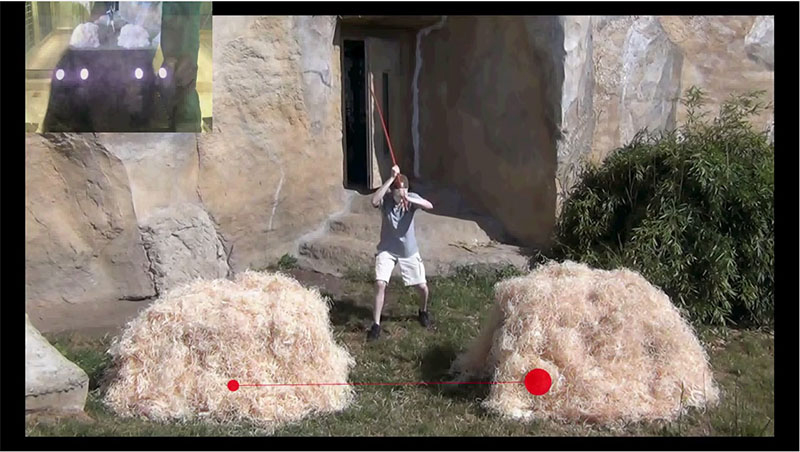Eye-tracking shows that apes understand false beliefs
A quirky video with ninja swords and ape costumes isn't just for the amusement of people on reddit.
A new study shows that great apes watching such a video can process false beliefs, which is the notion that someone's understanding of a situation may not be congruent with reality. The paper, published in Science , challenges the view that the ability to understand unobservable mental states is unique to humans.
In the video, a human and a person dressed in an ape suit are engaged in a hide and seek-like scenario. An eye-tracker on a TV monitor follows an observing apes' gaze, recording where the ape anticipates the action will occur next.
The video was adapted from a typical false-belief test that indicates whether someone can understand that another's actions are not driven by reality, but by beliefs about reality, even when those beliefs are false.
"Say there are two friends -- Sally and Bob -- and Sally puts her pen into her pencil case," explains Fumihiro Kano of Kyoto University. "She looks away for a moment, and Bob, in the meantime, puts the pen in his pocket. Sally would think the pen is still in her pencil case. This is an example of a false belief.
"Human infants only start understanding the concept of false beliefs after they're about four years old," continues Kano. "Despite their excellent social cognitive skills, great apes consistently failed the false-belief test in previous studies that required them to physically retrieve an object."
The videos and eye-trackers used for this study, on the other hand, were simplified from a version of the test used previously for human infants and great apes; with this design the great apes need only to sit, stare at the screen, and be passive spectators of test videos.
The team, led by Kano and Christopher Krupenye at Duke University, showed this video to chimpanzees, bonobos, and orangutans at Kyoto University's Kumamoto Sanctuary in Japan and the Max-Planck Institute in Leipzig, Germany. "The apes performed very well, even when compared to human infants and adults," notes Kano. "The results indicate that the great apes can predict how the human in the video will make the wrong choice. This shows that apes understand reality-incongruent beliefs, at least when the test subject only needs to watch the video."
“These findings suggest that this essential human skill -- to recognize others’ beliefs -- may be at least as old as humans’ last common ancestor with the other apes, which lived 13 to 18 million years ago”, elaborates Krupenye.
"This certainly puts to question the notion that the human psyche is unique and superior to other animals," adds Satoshi Hirata, senior author of the study. "With similar eye-tracking techniques we'd like to start testing great apes' imagination and ability to predict things that will happen further in the future."
This study was conducted by Fumihiro Kano (Kyoto University) and Christopher Krupenye (Duke University) with equal contributions. The apes were tested in Kumamoto Sanctuary, Kyoto University and Leipzig Zoo.

Great apes anticipate action based on false beliefs. Red dots indicate the apes' eye movement.
Paper Information
【DOI】 http://dx.doi.org/10.1126/science.aaf8110
Christopher Krupenye, Fumihiro Kano, Satoshi Hirata, Josep Call, Michael Tomasello. (2016). Great apes anticipate that other individuals will act according to false beliefs. Science, Vol. 354, Issue 6308, pp. 110-114.





